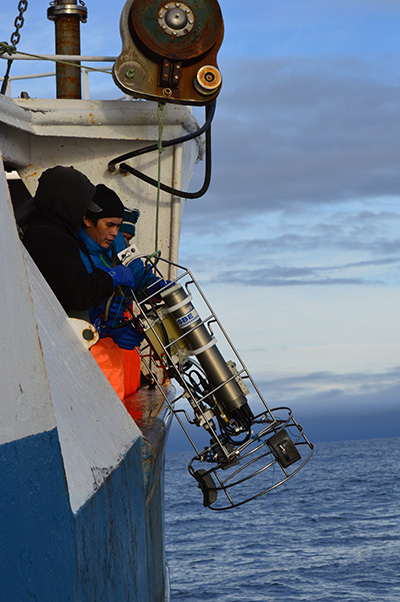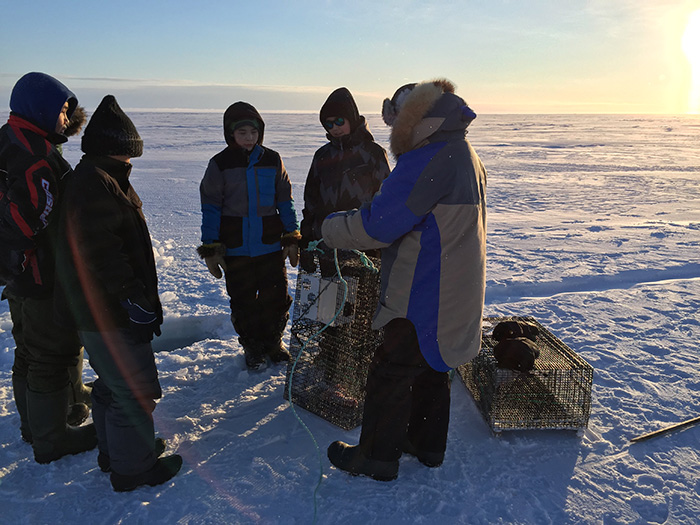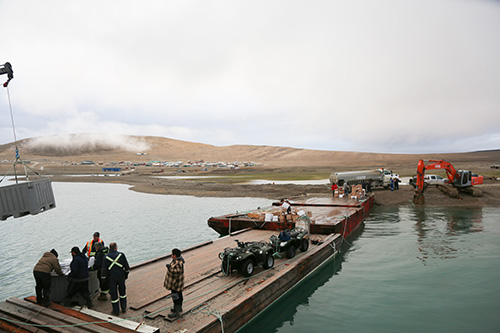Development Projects
AFA was established with the vision to ensure that the real beneficiaries of Nunavut’s offshore fishery are the residents of its owner communities, and by extension all of Nunavut. To achieve this vision, the partnership works collaboratively with its owner HTAs and Community Trusts to identify projects that contribute to the social and economic well-being of Arctic Bay, Grise Fiord, Qikiqtarjuaq and Resolute Bay. AFA assists its owner communities implement these projects by providing financial support, project management capacity, and fisheries expertise.
In general, AFA’s owner communities have chosen to invest in a combination of short and long-term projects. The shorter-term projects are recurring and address ongoing challenges like food security, while the longer-term projects are intended to develop local infrastructure and new economic opportunities.
Food Security
Every summer, AFA purchases groceries and hunting supplies from wholesalers in Newfoundland, based on requests from its owner communities. The Kiviuq is loaded with these supplies and visits each community in turn to deliver them. The goods are sold at cost.
These deliveries are significant events that contribute to local food security. Because food and supplies are air-freighted into each Nunavut community or shipped on the sea lifts, they are expensive, particularly in the high Arctic. AFA’s deliveries offer an opportunity for the communities to save a significant amount of money, as there is no mark-up or freight costs added. In fact, it was calculated that in 2014, AFA helped its four owner communities save over $500,000 in freight costs alone with its deliveries.

In addition, AFA works with its owner communities to increase access to country foods. For instance, the Kiviuq often transports hunters and their gear to nearby islands during the summer months to hunt caribou or musk-ox. These hunts were previously only possible in the winter when ice bridges form. Other initiatives include the purchase and importation of reindeer, hunted by Greenlandic Inuit, as a replacement for caribou in response to the Baffin Island moratorium on caribou hunts.
 Fisheries & Marine Research
Fisheries & Marine Research
In 2013, AFA began to conduct exploratory fisheries for turbot off Broughton Island and in Jones Sound using the Kiviuq. The intent was to identify potential populations of fish for adjacent communities to develop a food fishery first and eventually local commercial fisheries. These exploratory fisheries were funded by AFA, CanNor, National Research Council and the Government of Nunavut. AFA expanded the scope of its exploratory fisheries to include shellfish in 2014 and partnered with researchers from Memorial University’s Marine Institute. Funding was provided by AFA, CanNor, the Government of Nunavut, and Oceans North. Whelk pots caught three species of coldwater shrimp as well as whelk.
Based on these promising results, AFA provided fishing gear to its owner communities as well as training and mentorship in their use when requested. In addition, AFA’s Board of Directors elected to continue to invest in inshore fisheries and marine research to further support community-based economic development.
As a result, AFA expanded its research program in 2015. The partnership with the Marine Institute continued, and AFA began to collaborate with Ocean Tracking Network. Exploratory fisheries, baseline oceanographic data collection, experimental fisheries technology and acoustic telemetry studies were completed that summer with the support of various funding agencies and AFA’s own investments.
In 2016, AFA partnered with the Nunavut Offshore Allocation Holders Association (NOAHA, now re-named Nunavut Fisheries Association), whose membership includes all of Nunavut’s offshore fishing enterprises. By doing so, the impact and scale of AFA’s initial research efforts were expanded to the entire Baffin Region.
 The Nunavut Fisheries Association (NFA) research program has now secured multi-year funding from CanNor. Funding is also provided by the Government of Nunavut. Each member enterprise – including AFA – also contributes financially to this research. In addition, AFA remains heavily involved in this research, as the Kiviuq remains the primary platform for these necessary marine studies. The ongoing research includes but is not limited to:
The Nunavut Fisheries Association (NFA) research program has now secured multi-year funding from CanNor. Funding is also provided by the Government of Nunavut. Each member enterprise – including AFA – also contributes financially to this research. In addition, AFA remains heavily involved in this research, as the Kiviuq remains the primary platform for these necessary marine studies. The ongoing research includes but is not limited to:
-
Sustainable development of turbot fisheries (both inshore and offshore) with the Ocean Tracking Network
-
Fishing gear research and development to reduce by-catch and bottom impacts
-
Exploratory and emerging fisheries (inshore and offshore)
-
Baseline oceanographic data collection
AFA and the NFA continue to welcome new research suggestions.
Arctic Fishery Alliance Fund
AFA, in partnership with Carleton University, established the Arctic Fishery Alliance Fund in 2017. Students from AFA’s owner communities can apply for a scholarship to attend Carleton’s Aboriginal Enriched Support Program (AESP).
Each year, one recipient from one of the four communities is funded to attend Carleton under this program. The Arctic Fishery Alliance Fund covers the costs of:
-
Tuition fees
-
All compulsory miscellaneous fees
-
Travel to and from Ottawa
-
Accommodations
-
Living expenses
AESP is a one-year, full-time transition program for students whose goal is to attend university. In particular, it focuses on providing a support network of instructors, peer mentors, tutors and program coordinators for participants to development the time management, writing and academic skills necessary for success at university.
Participants take an Aboriginal Studies First Year Seminar and two additional university credited courses. They also take two supportive workshops bringing them to full time University studies. In addition, the program offers links to Ottawa-based Aboriginal resources.
Students who successfully complete the AESP will have their scholarships funded for their remaining years at Carleton University. As a result, AFA funds up to four students concurrently.
For more information on this scholarship, please contact AFA’s Community Development Officer Mark Akeeagok at 709-578-3278 or mark@arcticfisheryalliance.com.
 Community Economic Development & Infrastructure
Community Economic Development & Infrastructure
AFA also invests in projects unique to each of its owner communities. Chosen by the HTAs and/or Hamlets (as the Mayors are the Community Trustee chairs), these projects meet the needs and goals for each particular community. They are “for the community, by the community”. While AFA is always a strong advocate and supporter of these projects, AFA contributes funding, project management mentorship and support, and fisheries expertise only when requested. In other words, AFA defers to the leadership of the HTAs and Hamlets during these initiatives. Some of the ongoing or proposed projects include:
-
Development of a deep-water port in Qikiqtarjuaq
-
Market investigations and alternative supply chain logistics for Arctic char
-
Community-based winter turbot fisheries development and training
-
Business and strategic planning for tourism initiatives and country food processing plants
